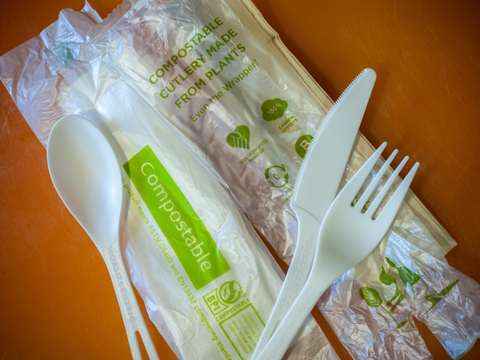
Closed Loop Partners’ Composting Consortium, the US Composting Council (USCC), and the Biodegradable Products Institute (BPI) are launching a grant programme to help composters and municipalities process certified compostable packaging by installing new equipment, conducting trials, and educating consumers.
Approximately 70% of around 200 commercial compost facilities in the United States claim to process both food waste and limited formats of food-contact compostable packaging. At the same time, around 45% of kerbside collection programmes for food scraps and 65% of drop-off collection programmes accept compostable packaging in certain formats.
Nevertheless, Closed Loop Partners asserts that most composting facilities in the U.S. only accept yard trimmings, with the composting industry in an ‘early stage’ of accepting food scraps – all while consumers take an increasing interest in diverting food waste.
In response, it has joined forces with the USCC and BPI to financially support composters and municipalities in diverting compostable materials away from landfill, ensuring they are processed, and pursuing a circular economy for organics. Together, the partners aspire to strengthen composting infrastructure, uplift best practices for processing compostable packaging, and drive the implementation of useful policies.
Closed Loop Partners recommends using the funding to offset the costs of new equipment tackling contamination from conventional plastics; running trials to process compostable packaging; and improving consumer participation and compost quality via updated signage, stickers, and other marketing and outreach materials.
Grant applications will remain open until the submission deadline on 13th June 2025; all funded projects must be completed by 1st March 2026. Further information about eligibility criteria, application details, and the grant programme itself is available via the Closed Loop Partners website.
“As the composting industry continues to grow, ensuring that compost manufacturers have the tools and incentives to successfully accept and process certified compostable packaging and food scraps is crucial,” said Frank Franciosi, executive director of the US Composting Council. “This funding will help strengthen the circular economy for organics, compostable packaging and our industry.”
“Composting plays a vital role in reducing organic waste in landfills and building healthy soils––but updates are needed to ensure that our composting system can meet the volumes and diversity of materials entering the organics stream today,” continued Paula Luu, senior project director at Closed Loop Partners’ Center for the Circular Economy and Composting Consortium lead. “These grants can provide composters and communities with the resources they need to scale their impact and support zero waste goals.”
“These new grants build on BPI’s micro-grant programme launched last year, which promoted programmes that already take compostable products, by providing larger sums that can move the needle by encouraging the development of new or expanded access to programmes,” added Rhodes Yepsen, Executive Director of the Biodegradable Products Institute. “Partnering with the Composting Consortium, whether on grants, field testing, contamination studies or consumer testing, aligns with our core mission, and we are excited to continue our collaborative approach to building pathways that are good for business, for people and the planet.”
The news comes after Lignin Industries announced that it had raised €3.9 million in funding to drive the scale-up of its bio-based thermoplastic derived from trees. The investment round was led by the company’s founders and majority owner, the Carrick family, and supported by over two dozen investors.
In other compostable news, Metpack has introduced its ‘home-compostable’ Ezycompost coated paper and paperboard. Coated with BASF’s ecovio 70 PS14H6 biopolymer, the material is FDA-approved and recommended for food-contact applications such as hot and cold cups, pots and trays for deep-freezing or microwave use.
Lavazza Coffee and Dualit have also removed paid-for search advertisements for their respective coffee pod and coffee bag products after the Advertising Standards Authority ruled that they were “likely to mislead” consumers about their industrial, but not home, compostability.
If you liked this story, you might also enjoy:
The ultimate guide to the Packaging and Packaging Waste Regulation in 2025
How are the top brands progressing on packaging sustainability?
Everything you need to know about global packaging sustainability regulation in 2025
The key to increasing the use of reusable packaging in supermarkets














No comments yet